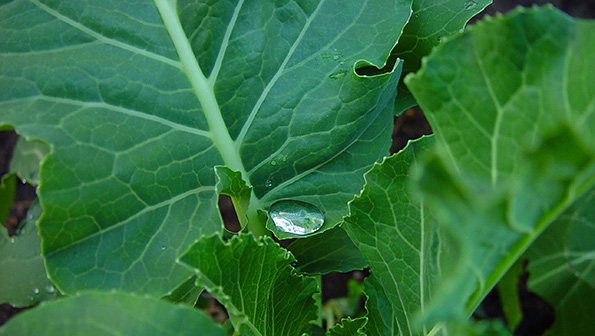The part of the broccoli plant that normally serves as compost could become the latest must-have leafy green.
The part of the broccoli plant that normally serves as compost could become the latest must-have leafy green.

Does a throwaway part of a common vegetable have what it takes to become the next superstar leafy green?
Foxy Organic, the first company to sell broccoli leaves in supermarkets (under the brand name BroccoLeaf), hopes so. Advertised as an exceptional partner for salads, cooking, and especially juicing, broccoli leaves—the part of the plant that traditionally gets tossed into the compost bin by farmworkers—are just as nutritionally rich as kale, and in some cases even best the popular power veggie.
 A single serving of broccoli leaves provides a full day’s dose of vitamin C, and is an excellent source of vitamin K. Though kale still wins in the potassium, iron, and calcium departments when compared by weight, broccoli leaves boast a similar amount of these nutrients per serving—and edge out kale in vitamin A content, a nutrient that’s key for healthy skin and vision. Broccoli leaves are also better suited for juicing than kale because of their sweeter taste and higher water content.
A single serving of broccoli leaves provides a full day’s dose of vitamin C, and is an excellent source of vitamin K. Though kale still wins in the potassium, iron, and calcium departments when compared by weight, broccoli leaves boast a similar amount of these nutrients per serving—and edge out kale in vitamin A content, a nutrient that’s key for healthy skin and vision. Broccoli leaves are also better suited for juicing than kale because of their sweeter taste and higher water content.
“We know how fantastic broccoli leaves are for the soil, but nobody considered it a viable produce item [before now],” says Tom Nunes V, vice president of operations for Foxy Organic. “Everyone in our industry’s been trying to find the next kale, and BroccoLeaf has been staring all of us in the face for decades.” Nunes says the idea first came to the forefront when the company ran a social media campaign focusing on juicing recipes, including several options with kale. A longtime grower came into the offices with a bundle of broccoli leaves, explaining that he juices with them instead of kale, which tends to clog up his machine.
But perhaps the best argument for the adoption of broccoli leaves as a super-green is their small carbon footprint. Farms throughout the country already expend resources to grow broccoli. Selling the part of the vegetable that's normally discarded as waste would mean saving water during a time of historic drought and climate instability—as long as the trend takes off, of course.
Currently, BroccoLeaf is only sold in select markets around New York City, Los Angeles, and San Francisco, but it’s also picking up steam with restaurants and juice companies.

Would you give broccoli leaves a try if you saw them in your local store or farmers' market?